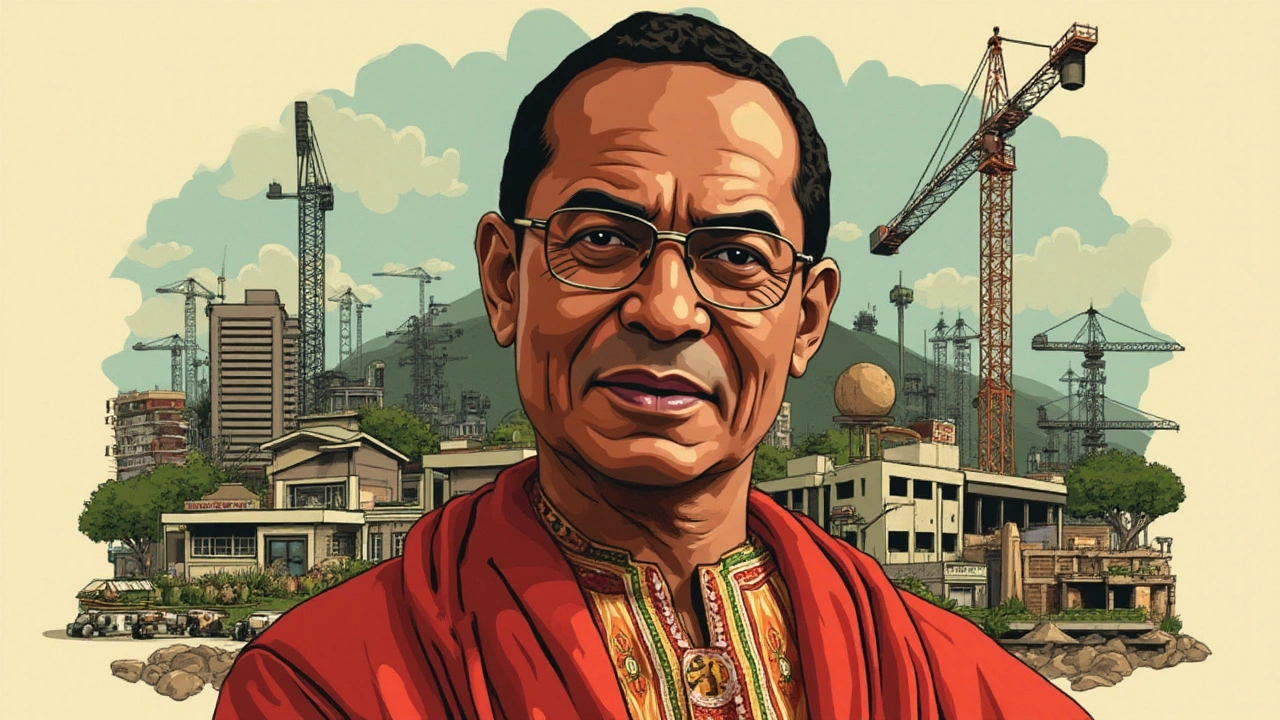In the heart of the Horn of Africa lies Ethiopia, a country renowned for its ancient history and vibrant culture. Yet, beyond its grand landscapes and rich traditions, Ethiopia boasts a burgeoning economy with remarkable figures at its helm. Among them stands the richest person in the nation, a testament to Ethiopia's growing prowess on the global stage.
Who holds this esteemed title, and what paths led them to prominence? By delving into the life and ventures of this individual, we get a glimpse of not only their incredible journey but also the dynamic economic environment of Ethiopia. From grassroots enterprises to mammoth multinational collaborations, the business landscape here is teeming with potential.
This narrative unfolds against the backdrop of thriving industries like agriculture, finance, and telecommunications, showcasing how visionaries in these fields are shaping Ethiopia's future. For those with ambitions of their own, the tale of the country's wealthiest person offers invaluable lessons and countless opportunities waiting to be seized.
- The Wealthiest Individual's Background
- Key Industries Driving Wealth
- Business Ventures and Investments
- Inspiration and Opportunities for Aspiring Entrepreneurs
The Wealthiest Individual's Background
In Ethiopia, the vibrant heartbeat of East Africa, one individual stands as a beacon of economic influence and achievement. This illustrious character has not only amassed significant wealth but also symbolizes the burgeoning potential within the Ethiopian economy. Born into a family deeply rooted in the country's evolving commercial landscape, their upbringing was steeped in the nuances of trade and entrepreneurship, setting the stage for a life dedicated to building and expanding enterprises across the nation.
Upon completing their studies, which were both rigorous and diverse, this extraordinary figure began their journey into the business world with an unyielding determination to succeed. Their initial ventures, though modest, laid the groundwork for what would become a sprawling empire of successful endeavors. With a knack for identifying opportunities where others saw none, they diversified their interests across several critical sectors, most notably in agriculture and telecommunications—industries that have been instrumental in propelling Ethiopia towards economic self-sufficiency.
As an advocate for innovation and technology, the richest person in Ethiopia has not shied away from embracing modern advancements. They have actively invested in digital and technological infrastructure, aligning with global trends while addressing local needs. This savvy approach has earned them not only wealth but also a considerable influence in shaping national policies and economic frameworks. Their story is a fascinating odyssey of vision married with action, highlighting both personal grit and profound strategic insight.
Influence extends beyond financials; this individual's philanthropy is equally noteworthy. Through various charitable foundations and initiatives, they have contributed significantly to educational and healthcare improvements in Ethiopia, elevating the quality of life for countless citizens. Such endeavors underscore a commitment to national development and reflect a deeply ingrained sense of social responsibility.
"Success is not just measured by the wealth you accumulate, but by the lives you transform along the way," they once remarked at a global economic forum, encapsulating their broader vision.
The legacy they are crafting is not solely financial but is also societal—a testament to the idea that wealth can and should be a force for good. For aspiring entrepreneurs eyeing the Ethiopian market, the life of this mogul offers invaluable lessons in resilience, innovation, and impact. Their journey illustrates the dynamic interplay between challenges and opportunities, revealing that in Ethiopia, the horizons are as limitless as one's ambition.

Key Industries Driving Wealth
Ethiopia’s economic landscape is a tapestry of evolving industries, each weaving its threads into the overall fabric of national prosperity. The most prominent of these industries is agriculture, a sector that employs millions and forms the backbone of the Ethiopian economy. Coffee, often referred to as ‘black gold’ in Ethiopia, accounts for a significant portion of exports and revenue. The nation's fertile highlands and favorable climate make it an ideal region for cultivating coffee beans that are celebrated worldwide. Additionally, Ethiopia is also a leading producer of other crops like pulses, oilseeds, and cereals. Despite the challenges of traditional farming techniques and infrastructure limitations, efforts to modernize and innovate continue to unlock immense potential in agriculture.
Another flourishing sector is telecommunications. With the introduction of liberalization policies and foreign investments, Ethiopia's telecommunications industry is undergoing significant transformation. The expansion of mobile and internet connectivity has been a game-changer, connecting vast parts of the country and opening new doors for commerce, education, and social interaction. Companies are increasingly investing in building infrastructure and technology to harness the untapped potential of digital networks. Recently, the issuance of new telecommunications licenses has attracted global telecom giants, sparking a new era of competition and growth. As Ethiopia advances, the telecom field is set to be a critical driver of economic development.
The economic impact of liberalizing telecom in Ethiopia can scarcely be overstated, noted by industry expert Daniel Getachew, emphasizes: “With digital inclusion comes innovation and prosperity, driving unprecedented economic growth.”
The finance sector also plays a pivotal role in driving wealth within Ethiopia. The banking industry, once characterized by stringent regulations and limited access, is gradually evolving. Financial reforms and technological advancements are paving the way for more inclusive financial services. Banks are swiftly adopting digital banking solutions, enabling a broader reach to previously underserved populations. The ongoing reform process presents vast opportunities for both local and international investors to tap into a growing market, marked by a youthful population eager for modern financial services. Microfinance is also gaining momentum, providing essential support for small and medium enterprises (SMEs) which form the backbone of the Ethiopian economy.
Moreover, the manufacturing sector in Ethiopia has seen considerable growth, driven by government initiatives to promote industrialization. Special economic zones and industrial parks are being developed, offering incentives for businesses to set up operations. The diversity of manufacturing operations ranges from textiles to cement production, with a notable emphasis on creating employment opportunities and adding value to local raw materials. Ethiopia's strategic geographic location as a gateway to African markets further bolsters its attractiveness as a manufacturing hub. Exploring partnerships and collaborations in manufacturing can substantially boost economic output, contributing to Ethiopia's vision of becoming a middle-income economy.

Business Ventures and Investments
In Ethiopia, the name often synonymous with success and wealth is that of Mohammed Al-Amoudi. Known for his extensive business ventures spanning multiple continents, Al-Amoudi’s investments have not only made him the richest person in Ethiopia but also a key player in Africa’s economic narrative. At the core of his empire lies a diverse portfolio that stretches across sectors such as construction, energy, agriculture, and hospitality. Driven by a vision to modernize and innovate, his business strategy often involves identifying growth opportunities in industries pivotal to the region’s development.
One of his most notable ventures is the Midroc Gold Mine, where his company holds significant operations in extractive minerals, contributing greatly to Ethiopia’s foreign exchange. The strategic positioning in the mining sector ensures a constant inflow of resources crucial for national growth. On another front, his venture into agriculture involves large-scale farming projects aimed at enhancing Ethiopia's food security. By integrating modern techniques with local expertise, Al-Amoudi's approach in agriculture reflects a commitment to sustainable development.
Al-Amoudi's reach extends beyond Ethiopia’s borders. His holding in the oil and energy sector is immense, notably through Preem, a leading fuel corporation in Sweden. Such international endeavors underscore his strategy of maintaining a global presence while deeply investing in his homeland. This dual focus not only fortifies his wealth but also positions him as a significant bridge between Ethiopia and international markets. Al-Amoudi's wealth in Ethiopia is further complemented by his interest in infrastructure. From roads to buildings, his companies have played a role in reshaping the Ethiopian landscape, fostering new opportunities across various business ecosystems.
"To build a nation, you must build its backbone—its infrastructure. That’s where future lies," he once shared in an interview, encapsulating his forward-thinking ethos.
An essential part of his business model is incorporating social responsibility, evident through multiple philanthropic efforts supporting educational and health initiatives. His impact on the community is as profound as his business acumen, making him a revered figure beyond just economic success. The lessons from his journey offer invaluable insights for aspiring business moguls Ethiopia seeking to make their mark on both local and international stages. By witnessing the breadth of his investments, one truly comprehends the depth of growth potential within Ethiopia's evolving economic landscape.

Inspiration and Opportunities for Aspiring Entrepreneurs
As the economic landscape of Ethiopia evolves rapidly, unlocking pathways for budding business minds, the story of its richest individual serves as more than just a tale of wealth; it is a rich tapestry of possibilities. Entrepreneurs in Ethiopia find themselves amidst a transformative era, where ancient traditions meet modern innovation. The ground is fertile for ideas, driven by a blend of burgeoning sectors like agriculture, finance, and telecommunications. These industries not only offer lucrative opportunities but also beckon with the promise of sustainable growth. The key for any aspiring entrepreneur is to observe, learn, and innovate by tapping into these thriving ecosystems.
Many established business moguls, including the wealthiest in Ethiopia, started their journeys with humble beginnings, echoing the axiom: every big business was once a small business. There's substantial emphasis on recognizing grassroots potentials. For instance, the robust agricultural sector—one of Ethiopia's economic pillars—provides a vast canvas for green innovations. Whether through the introduction of drought-resistant crops or leveraging technology to enhance distribution, the agricultural domain is ripe for exploration, encouraging new entrants to think outside the traditional box.
Advancements in telecommunications have opened another avenue for entrepreneurial zeal. The increase in mobile phone penetration and digital platforms creates a fertile market for tech startups. Innovators are leveraging this digital wave to craft solutions tailored to local needs, from mobile banking applications catering to the unbanked population to educational platforms overcoming geographical barriers. Embracing digital trends is not just a choice; it is a vital strategy for relevance and impact.
The investment climate is also becoming increasingly favorable for entrepreneurs. The Ethiopian government's deliberate steps towards economic reforms and opening up sectors like energy for private investments provide a conducive environment for ventures to thrive. These reforms, coupled with the vibrancy of a young population teeming with energy and ideas, suggest a golden era for new business adventures. The alignment of policy support with entrepreneurial intention provides a supportive bedrock that was less visible just a decade ago.
A mindset shift towards sustainable practices and social responsibility marks another opportunity for newcomers. As global trends lean towards ethical business, companies in Ethiopia adopting these practices not only gain global recognition but also earn the trust of increasingly informed local consumers. Entrepreneurs who lean into sustainable practices not only contribute positively to the environment but also set themselves apart in an increasingly competitive market.
There's much to draw inspiration from the journeys of current Ethiopian business icons. As the saying goes, "The best time to plant a tree was 20 years ago. The second-best time is now." Aspiring entrepreneurs can use these stories not as blueprints but as maps to guide their unique paths, learning from trials and triumphs alike. By daring to dream, tapping into Ethiopia's rich potential, and paving new paths, the next wave of entrepreneurial success is waiting to be written in this land of heritage and hope.

 Top Ethiopian Products: From Coffee to Pulses
Top Ethiopian Products: From Coffee to Pulses
 Top Trending Careers in Ethiopia: A 2024 Insight
Top Trending Careers in Ethiopia: A 2024 Insight
 How Much Does a Decent Apartment Cost in Ethiopia?
How Much Does a Decent Apartment Cost in Ethiopia?
 Understanding Harmful Traditional Practices in Ethiopia: A Career Awareness Guide
Understanding Harmful Traditional Practices in Ethiopia: A Career Awareness Guide
 Discovering the Rich Heritage of Ethiopian People
Discovering the Rich Heritage of Ethiopian People
Vinay Upadhyay
November 12, 2024 AT 16:41Wow, another “deep dive” into Ethiopia’s richest person. I’m sure the sheer brilliance of repeating that they’re “the wealthiest” adds massive value. Your article drags on about agriculture and telecom while ignoring the obvious fact that most of the wealth comes from overseas oil assets. Minor typo in “agricultrual” – hope you’ve got a spell‑checker. The “incredible journey” narrative feels more like a press release than insight. If you actually wanted to inform, a simple paragraph would have sufficed.
Eve Alice Malik
November 16, 2024 AT 04:01Hey folks, this piece really shines a light on how diverse Ethiopia’s economy is becoming. It’s cool to see someone from the region making such waves, especially in sectors like coffee and telecom where locals can really feel the impact. For anyone thinking about starting a business, the mix of agriculture and tech highlighted here shows there’s room for creativity. Keep the stories coming – they’re super inspiring for new entrepreneurs.
Debbie Billingsley
November 19, 2024 AT 15:21Ethiopia has long demonstrated its capacity for resilience and growth, and this article correctly underscores the nation’s strategic assets. The focus on agriculture, particularly coffee, aligns with our historic reputation as a global supplier of premium beans. Telecommunications expansion further illustrates our commitment to modernization without sacrificing cultural heritage. It is imperative that we continue to support homegrown tycoons who reinvest profits into national development.
Patrick Van den Berghe
November 23, 2024 AT 02:41Nice try but you missed the point entirely
Josephine Gardiner
November 26, 2024 AT 14:01While the enthusiasm expressed is commendable, it is essential to appraise the macroeconomic implications of such entrepreneurial endeavors with rigorous analysis. The sectoral diversification delineated in the foregoing article merits a systematic examination of its contribution to gross domestic product, employment rates, and foreign direct investment inflows. Moreover, an assessment of regulatory frameworks governing these industries would provide a more nuanced understanding of sustainable growth prospects within the Ethiopian economy.
Jordan Fields
November 30, 2024 AT 01:21The article enumerates key industries but lacks quantitative data.
Douglas Gnesda
December 3, 2024 AT 12:41To unpack the macro‑level implications, one must first contextualize Ethiopia’s agribusiness within the global commodity value chain. The coffee sector, for instance, operates under a volatile price regime dictated by futures markets, necessitating hedging strategies for risk mitigation. Simultaneously, digital infrastructure investments are catalyzing fintech penetration, which in turn stimulates micro‑enterprise financing pipelines. From a capital allocation standpoint, the aggregation of sovereign credit lines with private equity inflows yields a hybrid financing model that optimizes leverage ratios. Moreover, the regulatory liberalization of telecommunications introduces competitive dynamics, driving down consumer price indices while expanding broadband penetration metrics. In terms of operational efficiency, the adoption of precision agriculture-leveraging satellite imaging and IoT sensors-enhances yield forecasts and reduces input waste. This technological overlay dovetails with supply chain digitization, where blockchain‑based traceability assures compliance with international trade standards. Fiscal policy reforms, particularly the overhaul of corporate tax regimes, further incentivize reinvestment of earnings into domestic R&D ventures. Human capital development remains pivotal; targeted vocational training programs aligned with industry 4.0 competencies bridge skill gaps that otherwise constrain productivity gains. The interplay between these factors creates a synergistic ecosystem where wealth generation is not merely additive but multiplicative. Consequently, stakeholders-ranging from multinational conglomerates to indigenous SMEs-must adopt a holistic governance framework that balances profit motives with socioeconomic upliftment. Finally, continuous monitoring of key performance indicators, such as EBITDA margins and net foreign direct investment inflows, provides actionable insights for strategic recalibration. In sum, the convergence of sectoral diversification, technological integration, and policy reform constitutes the cornerstone of sustainable wealth accumulation in Ethiopia. Strategic partnerships with regional trade blocs can also amplify market access, reducing export barriers for agro‑industrial products. Overall, the sustained trajectory of wealth creation hinges on aligning macroeconomic stability with inclusive innovation ecosystems.
Abhijit Pimpale
December 7, 2024 AT 00:01While the omission of data is noted, the underlying growth trends remain evident through sectoral GDP contribution statistics.
Eric DE FONDAUMIERE
December 10, 2024 AT 11:21Yo guys this article is lit! It really shows how Ethiopia is blowing up on the economy scene – coffee, phones and all that good stuff. If you’re thinkin about diving in, now’s the time. Let’s get that hustle on and ride the wave together!
Pauline Herrin
December 13, 2024 AT 22:41Despite the enthusiasm, the preceding commentary suffers from a lack of analytical depth and contains numerous linguistic inaccuracies, thereby diminishing its credibility.